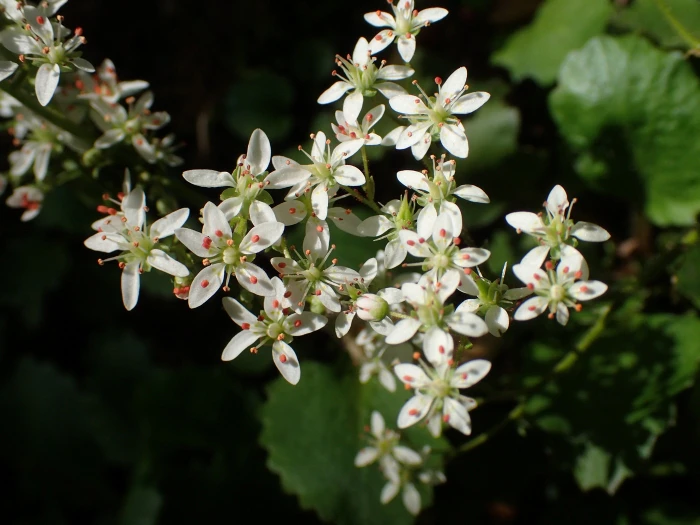Carey’s Saxifrage
(Micranthes careyana)
Carey’s Saxifrage (Micranthes careyana)
/
/

Evan M. Raskin
CC BY 4.0
Image By:
Evan M. Raskin
Recorded By:
Copyright:
CC BY 4.0
Copyright Notice:
Photo by: Evan M. Raskin | License Type: CC BY 4.0 | License URL: http://creativecommons.org/licenses/by/4.0/ | Rights Holder: Evan M. Raskin | Publisher: iNaturalist | Date Created: 2021-04-18T09:20:23-07:00 |

























Estimated Native Range
Climate Requirements for Timberwood Park, Texas
| This Plant | Your Site | Plant Suitability for Your Location | ||
|---|---|---|---|---|
| • Precipitation | 43" - 79" | 34" | Your precipitation may be insufficient for this plant. Irrigate N" / year. | Irrigate N" / year |
| • High Temp. | 70°F - 89°F | 93°F | Your summers may be too hot for this plant. | Too hot |
| • Low Temp. | 20°F - 29°F | 37°F | OK, but your winter temperatures are warmer than normal for this plant | OK |
This plant should grow well at your location with about N inches per year (Y minutes per month) of irrigation.
Summary
Micranthes careyana, commonly known as Carey’s Saxifrage or Golden Eye Saxifrage, is a perennial herb that is native to Southern Appalachia, found only in northwest Georgia, Tennessee, and North Carolina. It is rare throughout its range.. It is a slow-growing plant reaching a height of 0.5-1.5 feet (0.15-0.5 meters) and a width of 0.5-1 feet (0.2-0.3 meters). This saxifrage forms a basal rosette of leaves from which arise flowering stems bearing clusters of white flowers with yellow centers, blooming in late spring to early summer. The flowers are small but numerous, creating a delicate, frothy appearance that can add a touch of elegance to rock gardens and alpine plantings.
Carey’s Saxifrage is valued for its hardiness and ability to thrive in challenging mountain environments, making it a suitable choice for rock gardens, crevice gardens, and other areas with good drainage and limited soil. It is also appreciated for its attractive foliage and the subtle beauty of its flowers. In cultivation, it requires conditions that mimic its native habitat, including full sun to part shade, fast-draining loam or rocky soils, and medium amounts of water. While it is generally low-maintenance, it can be susceptible to root rot if overwatered or planted in poorly draining soils. Gardeners should be aware that it may not compete well with more aggressive plants, so it should be placed where it won’t be overshadowed.CC BY-SA 4.0
Carey’s Saxifrage is valued for its hardiness and ability to thrive in challenging mountain environments, making it a suitable choice for rock gardens, crevice gardens, and other areas with good drainage and limited soil. It is also appreciated for its attractive foliage and the subtle beauty of its flowers. In cultivation, it requires conditions that mimic its native habitat, including full sun to part shade, fast-draining loam or rocky soils, and medium amounts of water. While it is generally low-maintenance, it can be susceptible to root rot if overwatered or planted in poorly draining soils. Gardeners should be aware that it may not compete well with more aggressive plants, so it should be placed where it won’t be overshadowed.CC BY-SA 4.0
Plant Description
- Plant Type:
- Height: 0.5-1.5 feet
- Width: 0.5-1 feet
- Growth Rate: Slow
- Flower Color: White
- Flowering Season: Spring
- Leaf Retention: Deciduous
Growth Requirements
- Sun: Full Sun, Part Shade
- Water: Medium
- Drainage: Fast
Common Uses
Low Maintenance, Rock Garden
Natural Habitat
Mountainous regions, particularly in rock crevices and talus slopes
Other Names
Common Names: Golden Eye Saxifrage
Scientific Names: Micranthes careyana , Micranthes tennesseensis , Saxifraga careyana , Saxifraga tennesseensis
GBIF Accepted Name: Micranthes careyana